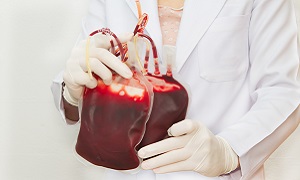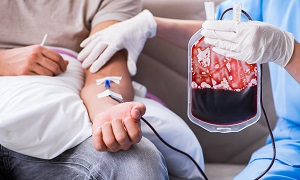Best Doctors in India for Sickle Cell Anemia treatment
Best Hospitals in India for Sickle Cell Anemia treatment
Hospital Highlights:
- Apollo Hospitals is a private healthcare group in India, with its headquarters based in Chennai. Established in 1983 by Dr. Prathap C. Reddy, the group offers a wide range of medical treatments and services across various specialties.
- It is renowned for emphasizing innovation and utilizing cutting-edge medical technologies into patient treatment.
- Known as India’s first corporate hospital, Apollo Hospitals is often credited for pioneering the private healthcare revolution in the country.
- With clinics and hospitals located all throughout India, Apollo Hospitals is a nationwide healthcare organization. Its presence can also be found in foreign countries.
- Preventive health examinations, medical and surgical treatment, and diagnostic centres are just a few of the services that the Apollo group provides.
- The group has several centres of expertise, including Cardiac Sciences, Neurosciences, Orthopedics, Emergency Care, Cancer Care, and Organ Transplantation.
- City: Chennai, India
Hospital Highlights:
- RIMC is a multi-specialty hospital in a sprawling area of 36 acres located in Chromepet, Chennai, Tamil Nadu, India.
- The facility has 450 beds including 130 critical care beds, 9 operating rooms, modern reference laboratories and radiology services, and is conveniently located near road, rail and air transportation.
- RIMC is led and managed by world-renowned physicians committed to healthcare.
- RIMC offers the broadest range of clinical care, education, and research. The hospital offers state-of-the-art technology and modern treatment facilities designed to provide health care at an affordable cost.
- Rela Institute is driven by patient needs, comfort and confidence.
- City: New Delhi, India
Hospital Highlights:
- Fortis Hospital in Shalimar Bagh is a multi-super specialty hospital that strives to provide world-class patient care by leaving no stone unturned.
- Fortis, Shalimar Bagh, with 262 beds and a 7.34-acre footprint, provides the best level of medical care through its team of doctors, nurses, technicians, and management professionals.
- City: Bengaluru, India
Hospital Highlights:
- Established in 2007, the Apollo Hospitals Bangalore is a 300-bed multispecialty hospital situated in Bannerghatta Road, Bangalore.
- Equipped with the state-of-the-art technology, it is a leading hospital dedicated to providing healthcare needs to patients with compassion and expertise.
- It is the first hospital to have completed the highest number of Robot Assisted Heart Surgeries in India.
- Over the years, it has successfully conducted some of the rarest medical procedures such as spinal angiolipoma excision, autologous chondrocyte implantations, and tibial tuberosity shift with MPSL reconstruction.
- The Apollo Hospitals Bangalore has the reputation of performing the greatest series of airway stents in the country.
- Additionally, the hospital is known for providing comprehensive treatment in specialties such as gastroenterology, urology, gynecology, oncology, colorectal surgery, etc.
- The “The Minimal Access Surgery Centre” (MASC), one of Apollo Hospitals, Bangalore’s premier Centres of Excellence, is devoted to the use of minimally invasive surgical procedures.
- In 2013, THE WEEK-A C Nielsen, Best Hospital Survey ranked Apollo Hospitals Bangalore as the 2nd best multi-speciality hospital in Bangalore.
- City: Mumbai, India
Hospital Highlights:
- Gleneagles Global Hospital The 450-bed facility comprises of 17-stories, housing state-of-the-art infrastructure, and advanced medical care facilities.
- The hospital offers end-to-end clinical, surgical, and diagnostic services. It is equipped with a team of eminent medical professionals aided by qualified nurses and medical staff
- The Hospital offers advanced Endoscopic procedures, Hepatobiliary and Liver Surgeries, Surgical and Medical Gastroenterology, Bariatric Surgery, and Robotic surgery.
- The hospital is a center of excellence for Orthopedics, Joint Replacement, Knee Replacement, and Hip Replacement surgery.
- City: Hyderabad, India
Hospital Highlights:
- CARE Hospitals were established in the year 2000, by CARE Group.
- The multispecialty hospital has 435 beds, including 120 critical care beds, with an annual inflow of 180000 outpatients and 16,000 in-patients.
- The hospital provides specialty medical services in Cardiology, Cardiothoracic Surgery, Pediatric Cardiology, Pediatric Cardiothoracic Surgery, Neurology, Neurosurgery, Nephrology, and Urology.
- The hospital has the first dual source, 128 slice CT scanner (for high precision cardiac imaging) – the first of its kind in south India.
- The hospital offers a wide range of accommodation facilities for the convenience of its varied patient base, ranging from general wards to super deluxe rooms.
- City: Mumbai, India
Hospital Highlights:
- Fortis Hospital in Mulund is a 315-bed multi-speciality tertiary care hospital with five JCI accreditations that offers a wide variety of diagnostic and treatment services. The Fortis Hospital in Mulund delivers patient-centred treatment with cutting-edge technology, highly skilled and experienced surgeons, and paramedical staff.
- This institution houses Maharashtra’s largest multi-organ transplant centre. It is also the first heart transplant centre in western India to conduct 100 or more consecutive heart transplants in under four years. It is the only hospital in the city to have multi-organ transplants and has handled the youngest patient for angioplasty. Fortis Hospital Mulund now boasts the first advanced surgical robot in central Mumbai.
- Cardiology and heart surgery, urology, nephrology, neurosciences, orthopaedics, digestive care, emergency and critical care, and maternity care are among the services provided by the hospital.
- City: New Delhi, India
Hospital Highlights:
- Manipal Hospitals, Dwarka, is a super-specialty hospital in Dwarka, New Delhi, which is a part of Manipal Hospitals Group.
- The hospital aims to provide the best treatment on par with international standards at a fraction of the cost.
- Equipped with 380 beds, the hospital is also one of the new age hospitals which are equipped fully with state-of-the-art infrastructure, cutting-edge technology as well as the latest and advanced clinical practices. The hospital also has 13 modular Operation theatres with 118 beds which are solely meant for critical care.
- The hospital comprises internationally acclaimed doctors and highly professional and experienced hospital and medical staff who are able to provide preventive, therapeutic, and diagnostic services all under one roof.
- City: Chennai, India
Hospital Highlights:
- Located in Chennai, India, MGM Healthcare is a top multispecialty hospital that provides all medical services under one roof.
- Since its founding in 2019, MGM Healthcare has quickly become a leading national referral centre, creating several innovative flagship initiatives.
- MGM Healthcare combines next-generation medical and digital technologies to provide better patient results.
- With 12 centres of excellence, more than 400 inpatient beds, 100 intensive care unit beds, and 24/7 emergency care, MGM Healthcare leaves no chance in redefining the patient experience in Chennai.
- MGM Healthcare boasts 250+ expert doctors across 30+ departments, including Cardiology, Pulmonology, Neurology, Obstetrics & Gynaecology, and more.
- They house 12 specialized Centres of Excellence, including Neurosciences, Orthopaedics, and Multi-Organ Transplantation.
- Their team of doctors, nurses, and paramedics works together to give every patient individualized treatment.
Hospital Highlights:
- Lilavati Hospital & Research Centre is India’s premier multi-speciality tertiary care hospital and has been recognised as a global medical excellence centre.
- Lilavati Hospital & Research Centre has built an unrivalled level of trust with its patients over the years, thanks to a solid foundation that comprises cutting-edge facilities, the best medical competence, research, education, and charity endeavours.
- The hospital is quite proud of the fact that it now serves patients from all kinds of backgrounds, not just from the United States but from all around the world.
- The hospital has a total of 323 beds, one of the largest Intensive Care Units (ICUs), 12 Operation Theatres with modern amenities, over 300 consultants, and almost 1,800 personnel.
Sickle Cell Anemia
Sickle cell anemia is an inherited blood disorder. People suffering from this disease don’t have adequate healthy red blood cells that can carry oxygen throughout their bodies. The red blood cells are flexible and disc-shaped. Normally, they can easily move through the blood vessels. However, in Sickle Cell Anemia, the red blood cells acquire the shape of a sickle or a crescent moon. The cells become sticky and rigid. Ultimately, they are not able to pass through the small blood vessels. This blocks or slows down oxygen and blood flow to various parts of your body.
Sickle cell anemia is an autosomal recessive disease and you will have two copies of the genes if you are suffering from this disease. The cells trapped in the blood vessels can cause tissue damage and pain. You can only inherit the disease from your family and you will have the disease by birth. You cannot acquire the disease later in life due to external factors. The other names for the disease are Hemoglobin S disease, sickle cell disorders, HbS disease and sickle cell disease.
Types of Sickle Cell Anemia
Hemoglobin carries oxygen in the red blood cells. Different mutations in the genes cause four different types of Sickle Cell Anemia.
Hemoglobin SS disease: Considered the most common type of Sickle Cell Anemia, it occurs if you inherit copies of the hemoglobin S gene from your mother as well as father. This leads to the formation of the Hb SS. It is the most severe type of SCD and you may experience symptoms at a high rate.
Hemoglobin SC disease: As a less severe type of anemia, it is the second most common form of SCD. When you inherit the Hb C gene from one of your parents & the HbS gene from the other parent, you will suffer from this type.
Hemoglobin SB+ (Beta) Thalassemia: It affects the production of the beta-globin gene. With less production of beta protein, the size of the red blood cells reduces. You will suffer from hemoglobin S beta thalassemia if you inherit the Hb S gene.
Hemoglobin SB 0 (Beta-zero) Thalassemia: It is another type of Sickle Cell Anemia that involves the beta-globin gene. You may experience some severe symptoms if you are suffering from this disease.
Causes of Sickle Cell Anemia
A defect in the hemoglobin-beta gene present on chromosome 11 causes sickle cell disease. Due to the defect, abnormal hemoglobin is formed. You will have the disease if both your parents pass on the abnormal hemoglobin gene to you. If you have only one defective hemoglobin-beta gene, you are a carrier of the disorder. You won’t experience the symptoms of Sickle Cell Anemia but you can pass the disease to your children if your husband or wife is also a carrier of the trait.
Symptoms of Sickle Cell Anemia
The first signs of Sickle Cell Anemia appear when the child is 5 months old. The symptoms of SCD include:
- Anemia- You will have very few red blood cells when the sickle cells break easily and die. While the red blood cells normally live for 120 days before their death, the sickle cells hardly live for 20 days. This causes anemia or a shortage of red blood cells. Because of this, your body won’t get adequate oxygen and cause fatigue.
- Pain- You will also experience episodic pain when the sickle-shaped cells obstruct the blood flow through the blood vessels. The intensity of the pain will vary and it may sometimes last for a few weeks.
- Swelling- The sickle-shaped cells block blood flow to the various parts of your body and cause swelling.
- Infections- You may be at a higher risk of infections when sickle cells cause damage to your so spleen.
- Delayed growth- Your body gets the required nutrients and oxygen for the growth from the red blood cells. Sickle-shaped cells slow down the growth of your body.
- Vision problems- The sickle cells may get stuck into the blood vessels that supply your eyes. This can cause damage to the portion of your eyes that produces visual images- the retina. Ultimately, you will suffer from vision problems.
Diagnosis of Sickle Cell Anemia
Treatment Options for Sickle Cell Anemia
Medications
Preventing infections
Blood transfusions
Stem cell transplant

Healthy diet
Avoiding extreme temperatures
Talking


















